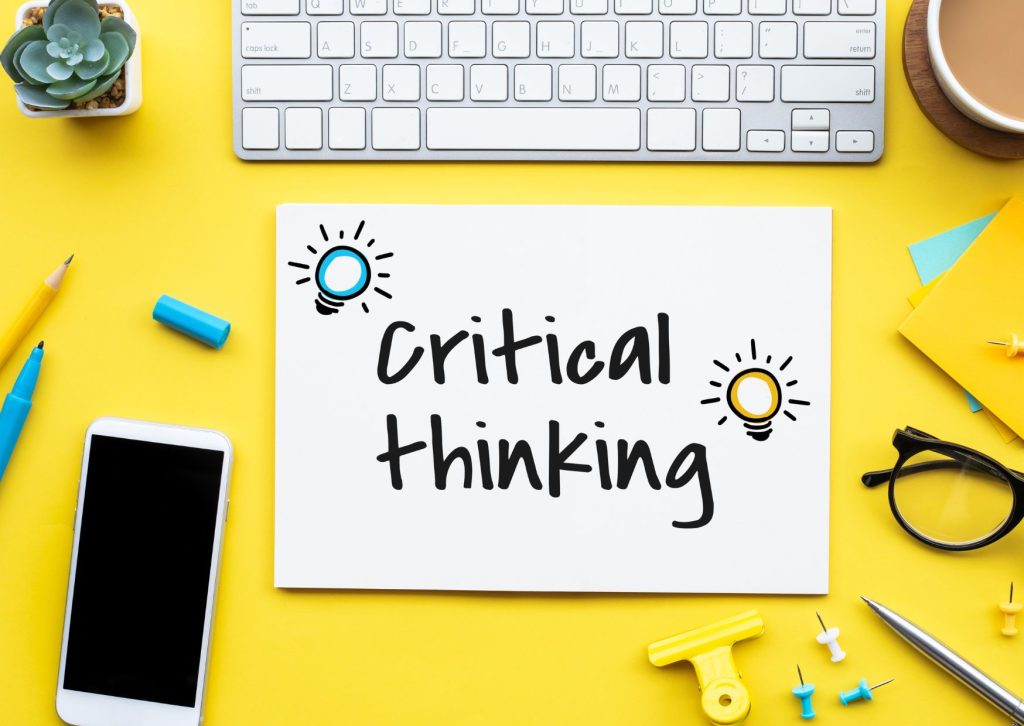In the dynamic landscape of the 21st century, critical thinking has emerged as a cornerstone skill, transcending academic boundaries to become a key component of professional success. Defined as the ability to analyse, evaluate, and synthesise information, critical thinking goes beyond rote memorization, encouraging individuals to approach problems with curiosity and a discerning mind. In this blog post, we delve into the five best critical thinking skills and explore effective strategies to sharpen them.
- Analysis
At the heart of critical thinking lies the ability to dissect information systematically. Analytical skills enable individuals to break down complex problems into manageable components, facilitating a deeper understanding of the issue at hand. To hone your analytical prowess, practice dissecting problems into smaller parts and identifying the relationships between them. Engage in activities that require you to scrutinise data, whether it’s examining research papers or dissecting real-world scenarios.
- Problem-Solving
Critical thinking and problem-solving are kindred spirits. The adept problem solver possesses the ability to navigate challenges with a cool head, leveraging analytical skills to identify and implement effective solutions. To enhance your problem-solving capabilities, engage in scenarios that simulate real-world challenges. Tackle puzzles, participate in group discussions, and seek out opportunities to apply your problem-solving skills in your personal and professional life.
- Creativity
Contrary to popular belief, critical thinking and creativity are not mutually exclusive. In fact, creativity is a crucial element in thinking critically. A creative mind approaches problems from unconventional angles, fostering innovative solutions. Nurture your creative thinking by engaging in activities outside your comfort zone, embracing diverse perspectives, and exploring different fields of knowledge. Encourage brainstorming sessions and be open to unconventional ideas to foster a more creative approach to problem-solving.
- Inference
The ability to draw logical conclusions from available information is a hallmark of effective critical thinking. Inference skills allow individuals to fill in the gaps between known facts, making educated assumptions and predictions. To strengthen your inference abilities, practice drawing conclusions based on evidence. Read diverse materials, engage in debates, and challenge yourself to make connections between seemingly unrelated pieces of information. This not only enhances your inference skills but also broadens your knowledge base.
- Decision Making
Critical thinking culminates in effective decision-making. The process of making informed decisions relies on a combination of analytical thinking, problem-solving, creativity, and inference. To refine your decision-making skills, deliberately put yourself in situations that require choices. Evaluate the available options, consider the potential outcomes, and make decisions based on a careful analysis of the information at hand. Reflect on the consequences of your decisions to refine and improve your decision-making abilities over time.
Improving Your Critical Thinking Skills: A Practical Approach
Now that we’ve explored the core critical thinking skills, let’s discuss practical strategies to enhance these cognitive abilities.
- Embrace Diverse Perspectives
Expose yourself to a variety of viewpoints, cultures, and disciplines. Engaging with diverse perspectives broadens your understanding of the world, fostering a more well-rounded and open-minded approach to problem-solving.
- Continuous Learning
Never stop learning. Critical thinking thrives on a foundation of knowledge. Stay curious, read extensively, and seek out opportunities for lifelong learning. The more you know, the better equipped you are to analyse and synthesise information effectively.
- Practice Reflection
Regularly reflect on your thoughts, decisions, and problem-solving processes. Analyse your successes and failures, identifying areas for improvement. This self-awareness contributes to the continuous refinement of your critical thinking skills.
- Engage in Socratic Questioning
Challenge yourself with Socratic questioning, a method that encourages critical thinking through a series of open-ended questions. This approach prompts deeper exploration of ideas, fostering a habit of rigorous analysis and evaluation.
- Collaborate and Communicate
Effective critical thinking often involves collaboration and communication. Engage in discussions, share your ideas, and actively listen to others. Collaborative environments provide valuable insights and diverse perspectives, enriching your critical thinking journey.
In conclusion, mastering the art of critical thinking is a continuous process that involves refining and integrating these five key skills. By embracing a proactive approach to learning and problem-solving, you empower yourself to navigate the complexities of the modern world with confidence and clarity. Your cognitive arsenal is a dynamic tool, ready to be honed and wielded in the pursuit of knowledge and success.



